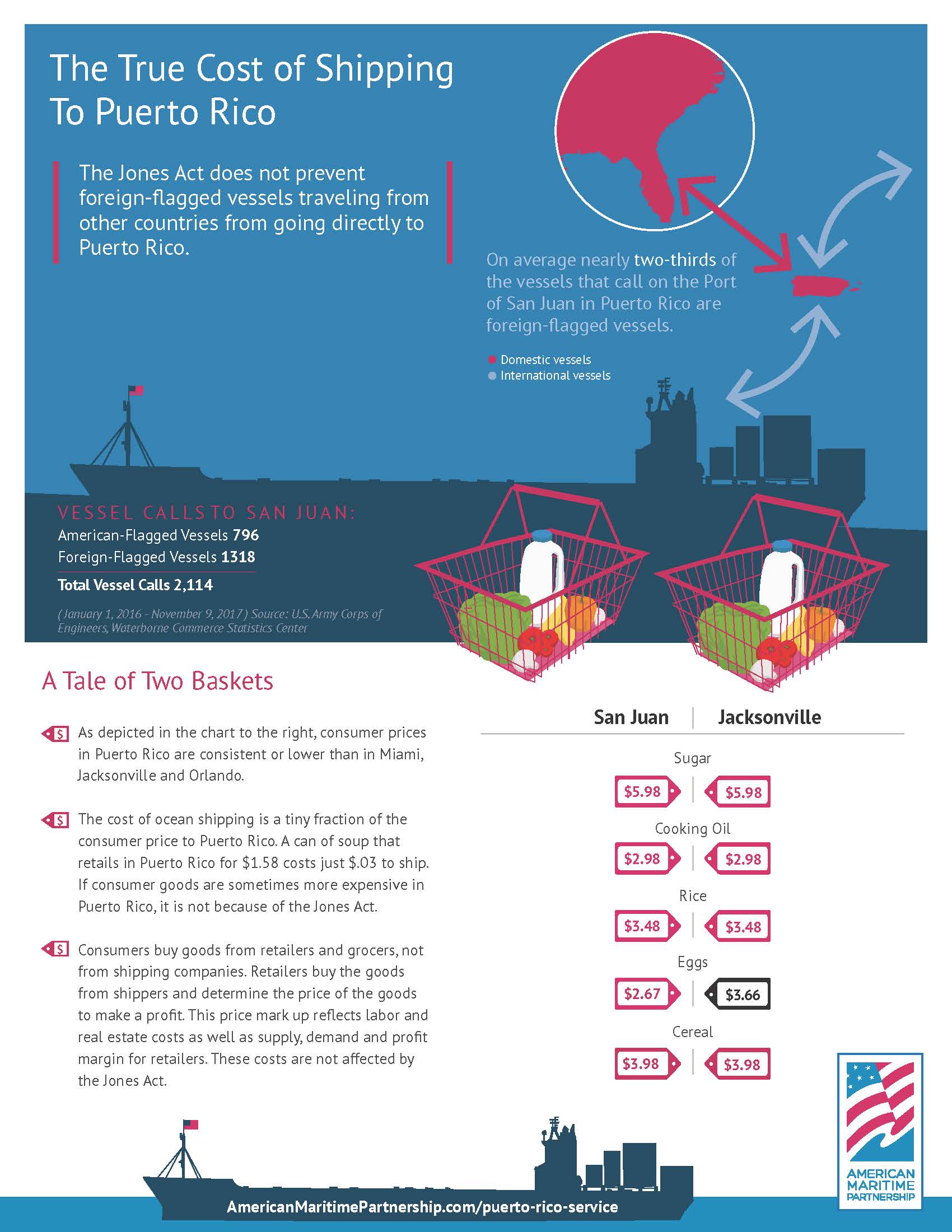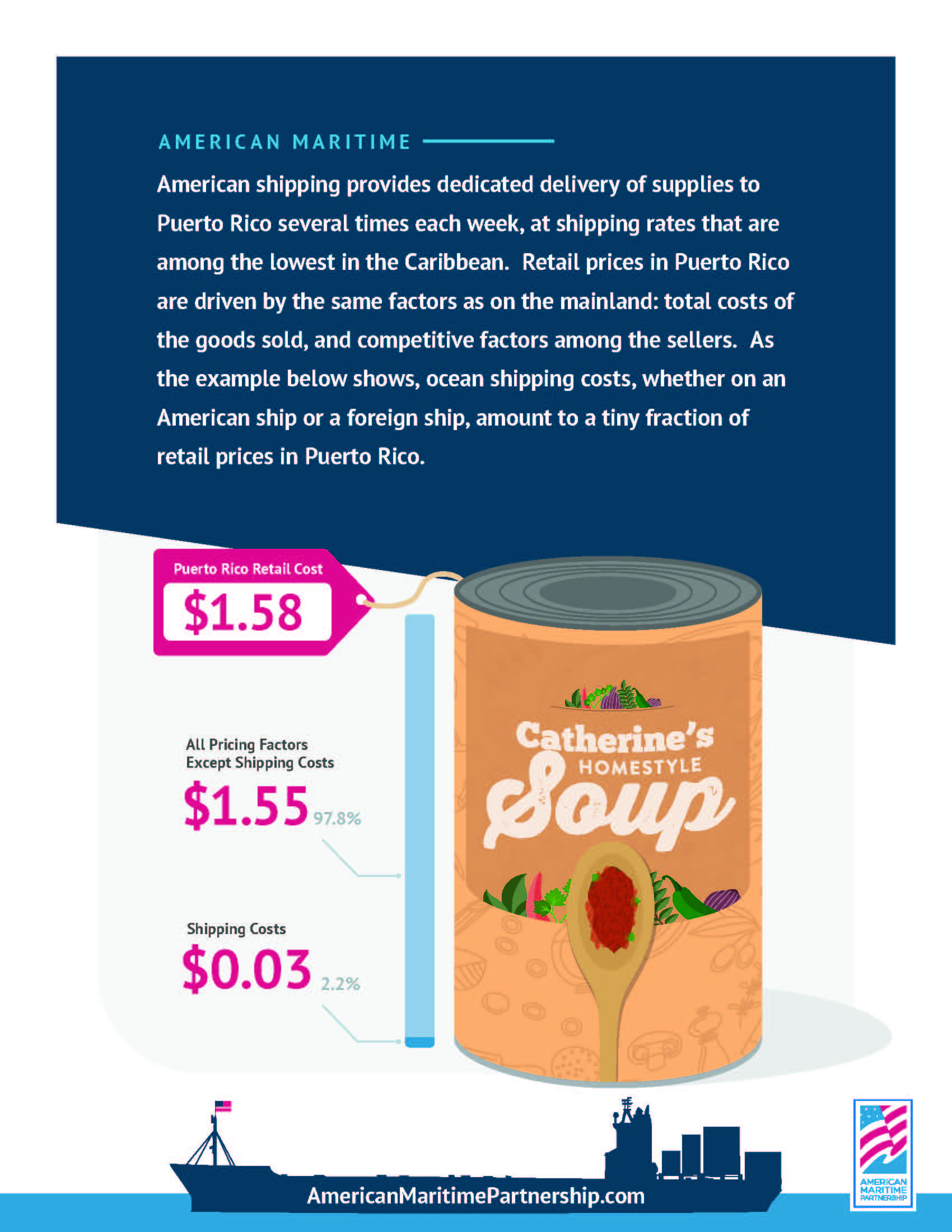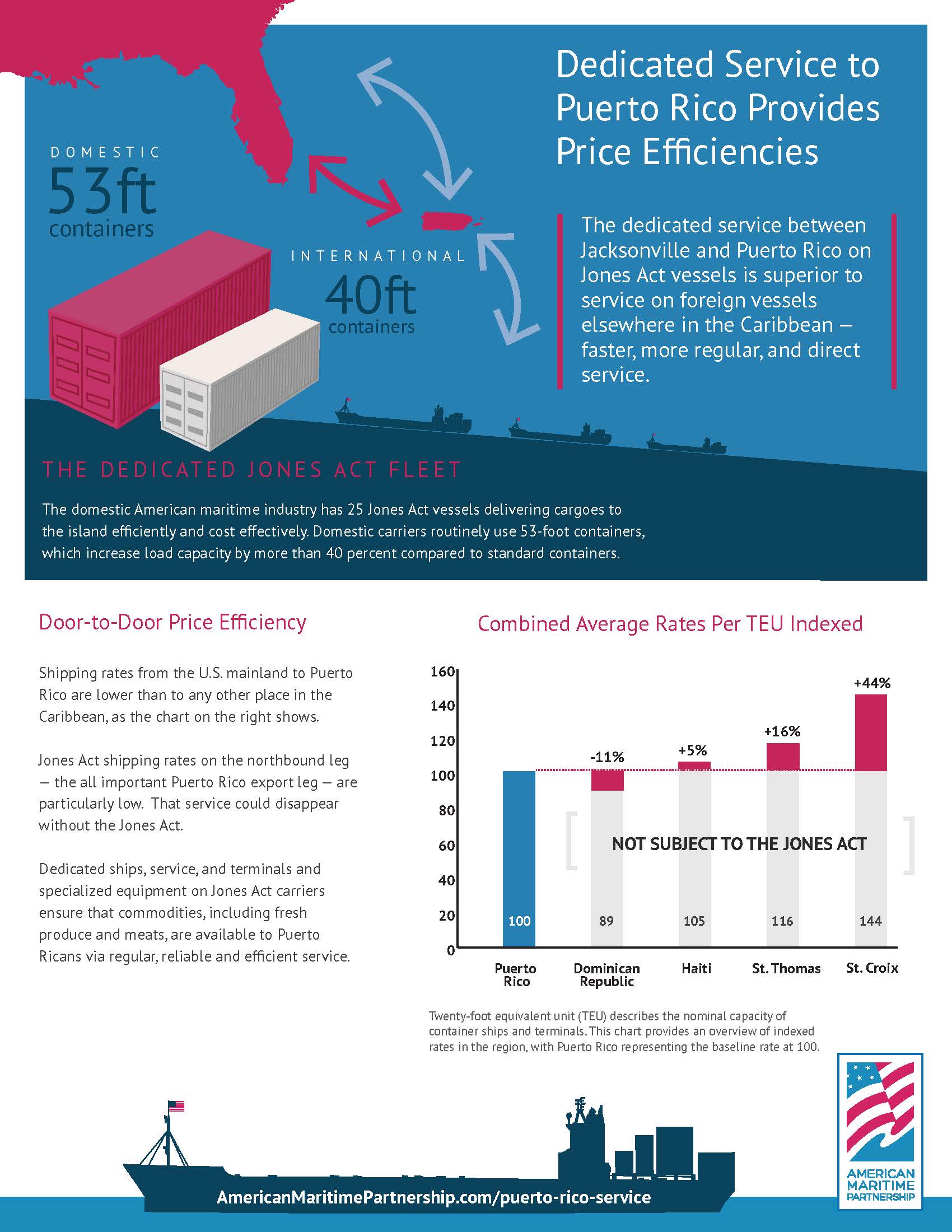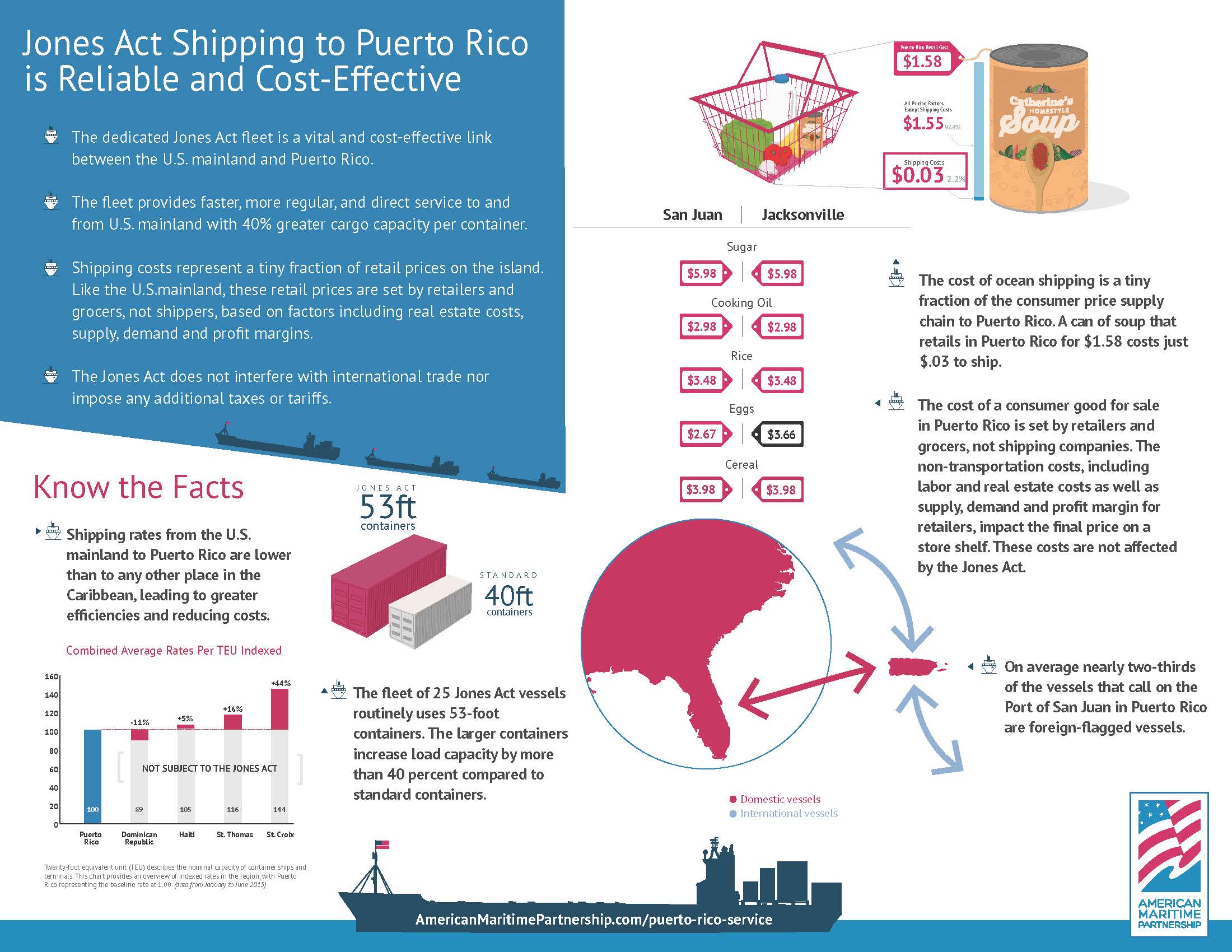Jones Act carriers have provided regular, dedicated service to Puerto Rico for decades. The Jones Act fleet servicing Puerto Rico includes modern, state-of-the-art vessels, such as the world’s first LNG-powered container ship, as part of domestic operators’ recent investments in the trade totaling nearly $1 billion. Puerto Rico also benefits from reduced backhaul rates from Puerto Rico to the mainland and specialized 53’ containers which provide extra capacity over standard 40’ containers. As part of these investments, Jones Act carriers support thousands of jobs in Puerto Rico. The domestic maritime industry is committed to meeting the needs of the island while also supporting the long-term economic requirements of the people and communities of Puerto Rico.
A 2018 study performed jointly by Reeve & Associates and Estudios Técnicos, Inc. concluded that the Jones Act has no impact on either retail prices or the cost of living in Puerto Rico. In addition, the report found that the state of the art maritime technology, Puerto Rico focused investments, and dedicated closed-loop service offered by Jones Act carriers provide a significant positive economic impact to the island, at freight rates lower or comparable to similar services to other Caribbean Islands.
Click Here to learn more about the Jones Act and the economic impact in Puerto Rico.
FACT SHEET: DOMESTIC MARITIME INDUSTRY IS DEDICATED TO PUERTO RICO
THE JONES ACT MYTHS IN PUERTO RICO
Claim: The Jones Act prevents cargo from foreign vessels to reach Puerto Rico.
False. Any foreign vessel can call on Puerto Rico. The Government Accountability Office (GAO) noted in a 2013 report that two-thirds of the ships serving Puerto Rico were foreign ships. 55 different foreign carriers provided imported cargo to Puerto Rico in a single month, as cited as an example by GAO. Foreign shipping companies compete directly with the American shipping companies in an intensely competitive transportation market.
Claim: Import costs are at least twice as high in Puerto Rico as in neighboring islands on account of the Jones Act.
There is no study that supports this statement in any way. In fact, anecdotal evidence about rates indicates that the opposite is true. For example, one analysis shows it is 40% more expensive to ship goods from the U.S. mainland on foreign vessels to the U.S. Virgin Islands (not subject to the Jones Act) than on Jones Act vessels to Puerto Rico.
Claim: Jones Act vessels lack sufficient capacity to reach communities impacted by Hurricane Maria.
In the immediate aftermath of the hurricane, one hundred percent of the island was without power, and roads were blocked by downed trees and debris. Goods are arriving to the island on vessels but bottlenecks on the roads are limiting arrival to the communities. The largest bottleneck is not getting goods to the island, but delivering goods once they arrive.
- Domestic maritime companies have the equipment at their terminals to handle the throughput at the terminals without overwhelming the shoreside and inland infrastructure.
- Domestic maritime roll-on/roll-off barges can immediately discharge cargoes while work is performed to restore power for cranes and other equipment at the terminals.
- Domestic maritime containerships can deliver cargoes from the S. mainland to Puerto Rico in three days.
Claim: A Jones Act waiver would add efficiency to the delivery of essential cargoes to impacted communities.
Because of infrastructure challenges, a Jones Act waiver could hinder, not help, relief efforts. A Jones Act waiver could overwhelm the system, creating unnecessary backlogs and causing confusion on the distribution of critical supplies throughout the island. Already there are logistical bottlenecks for Jones Act cargoes as a result of the inability to distribute goods within Puerto Rico due to road blockages, communications disruptions, and concerns about equipment shortages, including trucks, chassis, and containers.
Claim: The Jones Act adds significantly to the cost of goods in Puerto Rico.
Over the last decade, a parade of politicians and “experts” have attempted to estimate the so- called “cost” of the Jones Act in Puerto Rico. Because the estimates have been wildly contradictory, in 2012, Puerto Rico Delegate Pierluisi asked the GAO to determine the true “cost.” The GAO studied the issue for more than a year and debunked the previous estimates. First, the GAO said there are far too many factors that impact the price of a consumer good to determine the supposed cost related to shipping, much less the Jones Act. Second, the GAO said, one could not truly estimate the cost unless one knew which American laws would be applied to foreign ships if they were allowed to enter the domestic trades, which would certainly increase the cost of foreign shipping.
Claim: Changing the Jones Act in Puerto Rico will help the island, especially considering its current economic crisis.
A GAO study on Puerto Rico listed a number of potential harms to the territory itself if the Jones Act were changed, including the possible loss of the stable service the island currently enjoys under the Jones Act and the loss of jobs on the island. Moreover, American domestic carriers are making some of the largest private sector investments currently underway in Puerto Rico by investing nearly $1 billion in new vessels, equipment, and infrastructure. They employ hundreds of Puerto Rican American citizens on the island and on vessels serving the market, providing highly reliable, low-cost maritime and logistics services. These private sector jobs and reliable services are important to the long-term recovery of the Puerto Rican economy and would be jeopardized by changes to the Jones Act.
KNOW THE FACTS
GAO has found that “the [Jones Act] has helped to ensure reliable, regular service between the United States and Puerto Rico — service that is important to the Puerto Rican economy.” Changes to the Jones Act in Puerto Rico, particularly during the recovery effort, could be highly disruptive and counterproductive.
Changing the Jones Act in the Middle of the Recovery Effort Would Disrupt a Stable, Reliable Element of Ocean Transportation in Puerto Rico at the Worst Possible Time.
The American maritime industry worked closely with stakeholders in Puerto Rico as part of hurricane recovery efforts, and, by all accounts, the ocean shipping efforts have been highly successful. Domestic American companies have deployed 25 Jones Act vessels with multiple sailings each week to Puerto Rico. Within a week of the storm hitting, 11,300 containers with millions of pounds of relief supplies had been delivered to Puerto Rico on American vessels. And by the end of October, Jones Act vessels delivered more than 19,000 containers to Puerto Rico, including FEMA loads full of food, clothes, medicines, and other relief cargoes. Because American carriers serve Puerto Rico even in non-emergency situations, they have the infrastructure, employees, vessels, specialized equipment, and systems in place to serve Puerto Rico most efficiently. Congress should not change a stable, reliable element of Puerto Rico’s ocean transportation system in the middle of a crisis without precisely understanding the impact. The primary issue in Puerto Rico following the hurricane was the distribution of supplies once they arrived on the island.
GAO Has Found that the Jones Act Provides Important Benefits to Puerto Rico and Changing the Jones Act There Could Be Harmful to the Local Economy and National Security Readiness.
The definitive study of the Jones Act in Puerto Rico was prepared in 2013 by the U.S. Governmental Accountability Office (GAO), a rare unbiased, non-partisan analysis of this subject. GAO’s study found that “the [Jones Act] has helped to ensure reliable, regular service between the United States and Puerto Rico — service that is important to the Puerto Rican economy (source: U.S. Gov’t Accountability Office, GAO-13-260, Puerto Rico: Characteristics of the Island’s Maritime Trade and Potential Effects of Modifying the Jones Act (2013).” GAO said “modifying the Jones Act in Puerto Rico would have uncertain effects and may result in difficult trade-offs.” Similarly, the U.S. Maritime Administration has said “the loss of U.S.-flag service would reduce their ability to ensure that maritime transportation serves the Puerto Rico economy.” GAO particularly highlighted the potential negative effects of changes on Puerto Rico’s northbound shipping service to the mainland United States, citing the possibility of “sporadic service and higher rates.” In addition, the agency said that changes in Puerto Rico could affect American security because “the military strategy of the United States relies on the use of commercial U.S.-flag ships and crews and the availability of a shipyard industrial base to support national defense needs.” Given those findings and others like them, at the very least, any proposed long-term changes should be carefully reviewed by Congress given the potential for unintended consequences.
A Long-Term Waiver of the Jones Act Would Outsource American Shipping Companies and American Jobs — Including Puerto Rican Jobs —to Foreign Interests.
A long-term Jones Act waiver is nothing more than a scheme to replace American companies and workers with foreign companies and workers in the Puerto Rican shipping trades. It seems particularly harsh to propose replacing the Puerto Rican workers, who have dedicated themselves to keeping cargo moving during the crisis, and American shipping companies that have invested hundreds of millions of dollars in Puerto Rico. In addition, a change in the law in one major Jones Act trade could have widespread ripple effects in shipbuilding and other domestic shipping trades throughout the United States, making America more vulnerable without a compensating benefit.
The Supposed “Cost” of Jones Act Shipping in Puerto Rico Has Been Wildly Exaggerated.
It appears that the primary argument against the Jones Act in Puerto Rico is that it adds to transportation costs by requiring American companies and workers. Some have gone so far as to say that the Jones Act doubles the cost of consumer goods in Puerto Rico, a preposterous statistic with no basis whatsoever. The “cost” argument ignores the basic fact that Jones Act vessels must compete every day against foreign ships for customers in the Puerto Rican marketplace; in fact, two-thirds of the vessels serving Puerto Rico are foreign. Even GAO has rejected the so-called “cost” findings. According to publicly available data, this summer a can of soup on the shelf of a big box store in Jacksonville, FL sold for $1 and the exact same can of soup cost $1.81 in Puerto Rico. The Jones Act shipping cost to move that soup can from the U.S. mainland to Puerto Rico was a small fraction of the 81-cent differential. Also, GAO said, one of the benefits that Jones Act companies provide is “just in time” delivery, which helps to minimize inventory storage costs, which are expensive in Puerto Rico. Of course, a business in any sector in Puerto Rico could likely reduce its expenses if it could operate exclusively within domestic commerce and yet be exempt from all U.S. tax, employment, workplace, safety, and other laws, which is exactly what those who suggest Jones Act repeal are proposing — to allow foreign shipping companies and workers to operate in purely domestic trade between the U.S. mainland and Puerto Rico without being required to comply with U.S. laws.
America Has the Jones Act for a Reason.
The Jones Act and the American domestic fleet provide economic, national, and homeland security benefits across the United States. The domestic maritime industry contributes to approximately 650,000 American jobs, including jobs in Puerto Rico, and over $150 billion in economic impact annually, according to PricewaterhouseCoopers. U.S. military leaders and homeland security officials are among the strongest supporters of the Jones Act because it makes our nation more secure. In addition, the Jones Act reduces massive federal costs that would be necessary if there was no strong American fleet to help monitor the U.S. maritime border, support the domestic commercial shipbuilding industry, and provide a pool of trained mariners that is called on to support America’s sealift capacity requirements.
RELATED NEWS
Globalist Republicans Seeking to Weaken Jones Act Put America Last
Why Repealing The Jones Act Could Be A Disaster For The U.S.
Congressman Says Jones Act Waiver Unjustified, Changes Impractical
Puerto Rico Congresswoman On The Jones Act
Puerto Rico Relief Would Be Bleak Without Jones Act, Merchant Marine
Ignore the Critics, the Jones Act Enhances Puerto Rican Relief
Why Was The Jones Act Such A Big Deal In Puerto Rico?
US House Members: Do Not Extend Jones Act Waiver
U.S. Maritime Industry Dispels Jones Act Misinformation In Washington
Lawmakers Defend Jones Act; Supplemental Request Imminent
Strengthening border security: Look no further than the Jones Act
The Jones Act: A Red Herring in the Debate on Puerto Rico’s Energy Situation
Lexington Institute: Jones Act Vital to U.S. Border Security
Keeping Up With the Jones (Act)
AMP Shares Facts on the Jones Act in Puerto Rico with U.S. Senate
Puerto Rico debt crisis has many causes – but the Jones Act is not one of them
MTD Alerts Congress to Fallacies in Puerto Rican Anti-Jones Act Report
Scapegoating a Law that Protects Good Jobs will not Help Puerto Rico
U.S. Maritime Stakeholders Rally Behind ‘Strong’ Jones Act
AMP Chairman Outlines Rock Solid Support for the Jones Act in Congress at 2015 Tradewinds Conference
Navy League to Congress: Jones Act Critical for Puerto Rico’s Economic, National Security





